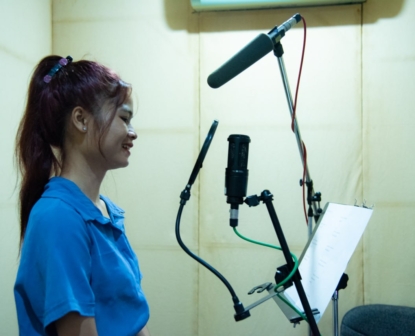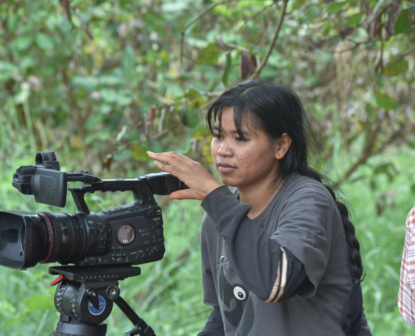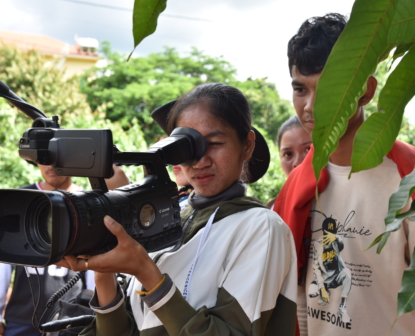Project
The arts of visibility and positive social change
-
Amount Funded
193,697 EUROProject Duration
01 Apr 2022 - 30 Apr 2024 -
-
Lead organisation
Bophana Audiovisual Resource Center-ARPAA
-
Bophana is the name of a young Khmer woman who was a prisoner at S21, a former high school in Phnom Penh turned into a prison by the Khmer Rouge. Bophana continued to write letters to her fiancé, breaking the Khmer Rouge#s interdiction of love and private life. She died in the prison at 25, after being tortured for more than five months. By adopting the name of Bophana, the Center is passing on the message of resistance, courage and dignity left for future generations by this woman through her letters and her heroic story. Bophana Center was launched, it was designated as the Bophana Audiovisual Resource Center.
Co-founded by film director Rithy Panh, the Bophana Center collects film and sound materials related to Cambodia and gives the public free digital access to this unique heritage. The large quality database attracts a diverse and wide audience, including Cambodian youth, teachers, students, scholars, tourists, and journalists. These archives are also brought to life through conferences, debates, exhibitions, and workshops organizedby the Center. Bophana also trains young Cambodians in cinema, audiovisual creation and new media, inspiring meaningful productionsabout their own culture. A place of exchange and interaction, the Bophana Center also supports creation in all its forms by welcoming artists: we create the archives of tomorrow.
– Goal, Vision, mission and value
Vision: Bophana Audiovisual Resource Center-ARPAA strives to become a leading non-profit and non-governmental archive center in the country and region in terms of reviving memory of the country and fostering Cambodian culture through arts and multimedia.
Goals:
To accomplish the two missions, Bophana Center-ARPAA aims to do as the followings:
1. Revive memory through archive collecting and safeguarding
2. Provide the public free digital access this unique heritages
3. Train people in cinema and audiovisual creation, enabling them to find their own voice by respecting the Gender Equality
4. Produce a wide range of audiovisual works about Cambodia
5. Diffuse the audiovisual documents through social media, website, application, television, festival and cultural events.Core Values:
– Uniqueness
– Integrity
– Diversity
– Inclusivity
– Discovery
– Development-
Organisation
Bophana is the name of a young Khmer woman who was a prisoner at S21, a former high school in Phnom Penh turned into a prison by the Khmer Rouge. Bophana continued to write letters to her fiancé, breaking the Khmer Rouge#s interdiction of love and private life. She died in the prison at 25, after being tortured for more than five months. By adopting the name of Bophana, the Center is passing on the message of resistance, courage and dignity left for future generations by this woman through her letters and her heroic story. Bophana Center was launched, it was designated as the Bophana Audiovisual Resource Center.
Co-founded by film director Rithy Panh, the Bophana Center collects film and sound materials related to Cambodia and gives the public free digital access to this unique heritage. The large quality database attracts a diverse and wide audience, including Cambodian youth, teachers, students, scholars, tourists, and journalists. These archives are also brought to life through conferences, debates, exhibitions, and workshops organizedby the Center. Bophana also trains young Cambodians in cinema, audiovisual creation and new media, inspiring meaningful productionsabout their own culture. A place of exchange and interaction, the Bophana Center also supports creation in all its forms by welcoming artists: we create the archives of tomorrow.
– Goal, Vision, mission and value
Vision: Bophana Audiovisual Resource Center-ARPAA strives to become a leading non-profit and non-governmental archive center in the country and region in terms of reviving memory of the country and fostering Cambodian culture through arts and multimedia.
Goals:
To accomplish the two missions, Bophana Center-ARPAA aims to do as the followings:
1. Revive memory through archive collecting and safeguarding
2. Provide the public free digital access this unique heritages
3. Train people in cinema and audiovisual creation, enabling them to find their own voice by respecting the Gender Equality
4. Produce a wide range of audiovisual works about Cambodia
5. Diffuse the audiovisual documents through social media, website, application, television, festival and cultural events.Core Values:
– Uniqueness
– Integrity
– Diversity
– Inclusivity
– Discovery
– Development -
Project
“The Arts of Visibility and Positive Social Change” project aim to transform and empower voices of indigenous youths, particularly women through indigenous knowledge, artivism and multimedia technology. There are four primary innovative approaches under this project:
1). Strengthen and build the capacity of the 24 (50% are women) Indigenous youth in arts of filmmaking and multimedia and to equip them to be activists for behavior changes in their community by scaling up on the success of previous project supported by Voice.
2). The trained indigenous filmmakers from the previous project will support mentor students for this project. The indigenous youth will help each other to strengthen their skills and capacity building in documentary filmmaking. At least 12 documentary films co-produced under the exchange program between the indigenous youth in Ratanakiri and Mondulkiri province. The indigenous youth will become the activists contributing to the better improvement and sustainable development in their community.
3). By join partnership with local NGOs based in the target areas (CIPO), the training program is taken place in the home provinces of Indigenous youths in order to promote more accessible, engage more community participation, build trust and ownership of the indigenous community for this project.
4). Develop a film-making glossary provide students, trainers, mentors and technicians with a common understanding of the key stages and techniques of filmmaking that will be useful for past, current and future students. The short glossary will be available in Jarai, Tampuon, Kreugn, Bunong, Khmer and English languages to facilitate transmission, dissemination and ownership of the project by the different ethnic groups involved.
The 24 young indigenous students are trained and have capacity to produce 24 short films that investigate the political, environmental, economic and social issues faced by the most vulnerable people in their communities. The trained Indigenous youth will work with their community elder artist or artisan to revive their endangered arts to be documented and promoted to the wider public. At least, 12 artist/artisans from 6 different communities are documented. They will gain the opportunity to be offered jobs by various institutions that will contribute to their economic empowerment because there is currently no accredited multimedia or film school in Cambodia which can provide these skills. The students’ documentary films will have impact on the general public, especially policy-makers.
The film screenings followed by community dialogue in both physical format and virtual format using ICT tools can help facilitate the inclusive public debate on social issues that Indigenous communities are facing.
This 21 months project is target to implement in 6 different indigenous communities in Ratanakiri and Mondulkiri province.
-
-
“The Arts of Visibility and Positive Social Change” project aim to transform and empower voices of indigenous youths, particularly women through indigenous knowledge, artivism and multimedia technology. There are four primary innovative approaches under this project:
1). Strengthen and build the capacity of the 24 (50% are women) Indigenous youth in arts of filmmaking and multimedia and to equip them to be activists for behavior changes in their community by scaling up on the success of previous project supported by Voice.
2). The trained indigenous filmmakers from the previous project will support mentor students for this project. The indigenous youth will help each other to strengthen their skills and capacity building in documentary filmmaking. At least 12 documentary films co-produced under the exchange program between the indigenous youth in Ratanakiri and Mondulkiri province. The indigenous youth will become the activists contributing to the better improvement and sustainable development in their community.
3). By join partnership with local NGOs based in the target areas (CIPO), the training program is taken place in the home provinces of Indigenous youths in order to promote more accessible, engage more community participation, build trust and ownership of the indigenous community for this project.
4). Develop a film-making glossary provide students, trainers, mentors and technicians with a common understanding of the key stages and techniques of filmmaking that will be useful for past, current and future students. The short glossary will be available in Jarai, Tampuon, Kreugn, Bunong, Khmer and English languages to facilitate transmission, dissemination and ownership of the project by the different ethnic groups involved.
The 24 young indigenous students are trained and have capacity to produce 24 short films that investigate the political, environmental, economic and social issues faced by the most vulnerable people in their communities. The trained Indigenous youth will work with their community elder artist or artisan to revive their endangered arts to be documented and promoted to the wider public. At least, 12 artist/artisans from 6 different communities are documented. They will gain the opportunity to be offered jobs by various institutions that will contribute to their economic empowerment because there is currently no accredited multimedia or film school in Cambodia which can provide these skills. The students’ documentary films will have impact on the general public, especially policy-makers.
The film screenings followed by community dialogue in both physical format and virtual format using ICT tools can help facilitate the inclusive public debate on social issues that Indigenous communities are facing.
This 21 months project is target to implement in 6 different indigenous communities in Ratanakiri and Mondulkiri province.
-
Indigenous Women in the Media
We observe that Indigenous communities continue to be plagued by issues related to early marriages, inability to complete high schools, and land and natural resources issues. Indigenous parents do not yet have faith in education, which is why they have their children drop out of school to help them with farming. We find that Indigenous women and girls are the most vulnerable. Indigenous parents do not trust anyone other than their community members; therefore, they do not allow their children, especially girls, to go to school or work in other provinces or Phnom Penh. Based on these challenges, the Bophana Center is implementing a project called “The Art of Visibility and Positive Social Change” in 2022 in Ratanakkiri with the support of VOICE program.
The objective of this project is to provide opportunities for Indigenous youth, especially women, to express their voices through knowledge about Indigenous tradition, traditional arts, active arts, and multimedia technology. The project provides scholarships to 21 indigenous trainees, aged between 18 and 30, from Ratanakkiri and Mondulkiri provinces to participate in video documentary and multimedia training. In addition, the project will provide them with basic knowledge of information technology, knowledge of Indigenous women’s rights, and signs of gender-based violence, climate change, and challenges facing Indigenous people in Cambodia.
To ensure the participation of young people, especially women from many different indigenous communities, in this project, the Bophana Center provided training in Banlung, Ratanakkiri Province. As a result, the project saw 50% female participants, while the previous project implemented in Phnom Penh had only two women.
Through this project, the Bophana Center continues to engage young people and community members, especially the elderly in Indigenous communities, in the transfer of traditional knowledge and sharing of life experiences and challenges in the community through participatory film production. A total of 31 documentaries have been produced by indigenous youth in indigenous languages. Six Indigenous youths have been employed. And their parents are happy with the outcome and some parents also allow their children to work in Phnom Penh.
We hope that after we screen this film in Indigenous communities with the participation of parents of students, students, community members, local authorities, and partner organizations, the rate of early marriages will be reduced and Indigenous parents will change their perceptions about the benefits of education, and the indigenous youth we have trained will become role models for other young people in the community and continue to use documentary filmmaking skills to showcase their cultural traditions, and community challenges.
-
News





